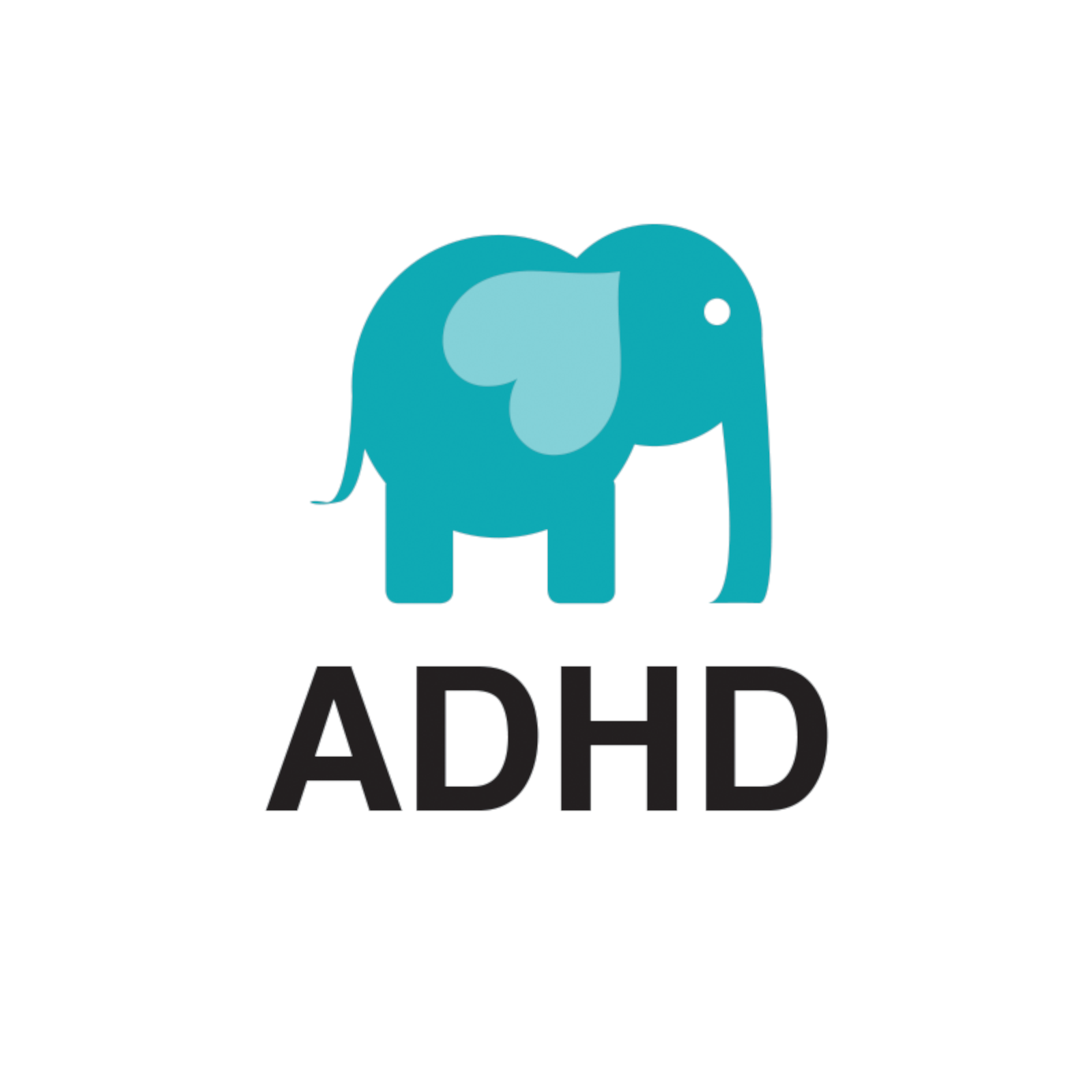
818K
Downloads
213
Episodes
Drawing on years of experience working with families, Parenting Coaches Siope Kinikini and Kimber Petersen share how families can improve, heal, and find success using the proven methods of the Teaching-Family Model. Visit smarterparenting.com to learn more.
Episodes
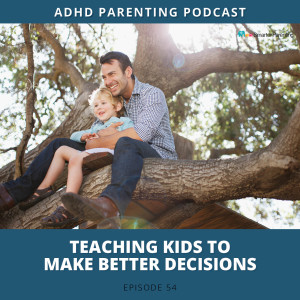
Wednesday Dec 25, 2019
Ep #54: Teaching kids to make better decisions
Wednesday Dec 25, 2019
Wednesday Dec 25, 2019
Teaching kids to make better decisions is possible and can be taught.
Often kids make decisions based on emotions, which doesn’t always lead to the best choices. When they make decisions based on emotions, they aren’t always able to see the whole picture.
Using the SODAS Method helps in the decision making process as it shows kids they don’t need to make decisions based on emotions. By working through all the steps, children can see they have options and what is positive and negative about their options.
SODAS is an acronym. SODAS stands for Situations, Options, Disadvantages, Advantages, and Solution.
For each situation, have them come up with three options. Then for each of the three options have them come up with three advantages and three disadvantages. Then looking at their options, they can come up with a solution.
If they aren’t able to come up with a solution, have them come up with new options and do the process again.
The decision making process can be used for almost any situation and can work with children of all ages.
Watch the behavior skill video on SmarterParenting.com to see how the behavior skill works. https://www.smarterparenting.com/lesson/view/decision-making-sodas-method/
For full podcast transcript and show notes visit: https://www.smarterparenting.com/adhd-parenting-podcast/
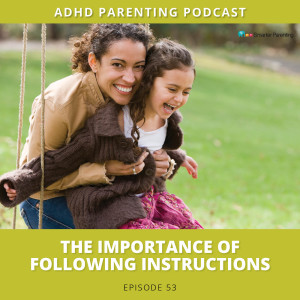
Monday Dec 23, 2019
Ep #53: The importance of Following Instruction
Monday Dec 23, 2019
Monday Dec 23, 2019
The importance of Following Instructions can not be stressed enough. The ability to Follow Instructions is something that every person needs to know how to do if they want to be successful in life.
The behavior skill of Following Instructions found on SmarterParenting.com shows parents and children how to be successful in following instructions they receive.
When parents teach Following Instructions they need to be aware of their expectations. When expectations aren't matched to our child's ability, it leads to frustration for all.
Our expectations should be different for a five-year-old and a fifteen-year-old. Meeting them at their ability level sets them up for greater success.
The four steps of Following Instructions are:
First, get the child's attention
Second, give a clear, detailed, descriptive instruction
Third, the child says, "Okay" and immediately does it
Fourth, child returns and reports when the task is finished
Four simple steps. There is excellent power if learning how to do them.
When learning the skill of Following Instructions, we recommend doing the following.
First, incorporate Role-plays and reverse Role-plays. Role-plays allow your child to get a sense of what it is you're asking them to do by having them giving and following instructions. Role-plays are what make any skill successful as it's in the practicing that children understand and learn the skill.
Second, break down your expectations into clear instructions. If you want your child to clean their room, break it down into all the tasks you want accomplished. The more detailed you're able to be in your instructions, the better your child can accomplish the task. If you want your child to pick up their dirty clothes, put them in their hamper, and bring their hamper to the laundry room, that's what you need to tell them to do. If you tell them, "pick up your clothes," don't be surprised if that's all they do even though your expectations were for them to bring it to the laundry room.
Third, praise them when they do it. Praise is a great motivator and will encourage them to continue doing the task.
Every child can find success with Following Instructions!
Watch the behavior skill video on SmarterParenting.com to see how the behavior skill works. https://www.smarterparenting.com/lesson/view/following-instructions/
For full podcast transcript and show notes visit: https://www.smarterparenting.com/adhd-parenting-podcast/
Join the Smarter Parenting Club. https://www.smarterparenting.com/adhd-parenting-podcast/
Help the ADHD Smarter Parenting Podcast continue. Donate today! https://www.smarterparenting.com/donate-now/
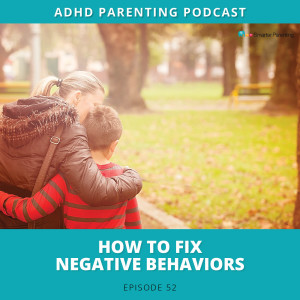
Wednesday Dec 18, 2019
Ep #52: How to fix negative behavior
Wednesday Dec 18, 2019
Wednesday Dec 18, 2019
The best time to correct bad behavior is as soon as possible. The behavior skill of Correcting Behaviors shows parents how.
When our children do something wrong, it’s easy to get upset or frustrated. Getting angry or frustrated is the worst thing you can do as it shifts the focus and makes teaching more difficult. Using the steps of Correcting Behaviors allows a parent to fix negative behavior without being drawn into the emotion as the steps give you a guide to follow.
Parents find it especially helpful to use the words, “You have earned a consequence,” and “What you should have done is” as those words keep you from being drawn into the emotion of the situation.
Children will want to draw us into the emotion piece or to get us to focus on something else. Stick with the steps to address the original behavior. Continue to address the original behavior until they have complied with what was asked of them. The only time to discuss something other than the original behavior is if their new behavior is a danger to themselves or others.
When the environment around them doesn’t influence a child, they are going to grow into successful adults.
The child behavior management strategies of Correcting Behaviors help parents correct and teach through practice. When a child understands what they should have done instead and then practices that behavior, it is influential in assisting children in changing their negative behavior.
Practicing is an essential step in fixing negative behavior as children don’t always know what they should be doing instead. By having them practice the new behavior, they are more likely to repeat the positive reaction the next time they are in that situation.
Correcting Behavior is a vital skill that all parents need to master.
Watch the behavior skill video on SmarterParenting.com to see how the behavior skill works. https://www.smarterparenting.com/lesson/view/correcting-behaviors/
For full podcast transcript and show notes visit: https://www.smarterparenting.com/adhd-parenting-podcast/
Join the Smarter Parenting Club. https://club.smarterparenting.com/
Help the ADHD Smarter Parenting Podcast continue. Donate today! https://www.smarterparenting.com/donate-now/
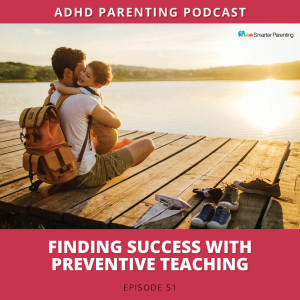
Monday Dec 16, 2019
Ep #51: Finding success with Preventive Teaching
Monday Dec 16, 2019
Monday Dec 16, 2019
One of the best things parents can do in preparing kids for success is to use the behavior skill of Preventive Teaching. Preventive Teaching is just like it sounds. We are preventing problems ahead of time by teaching what behavior we expect. Preventive Teaching is used to address both negative and positive behavior.
Preparing a child for new situations is very comforting as it signals that you are watching out for them and giving them what they need to handle unfamiliar situations. Children need help, especially when dealing with new situations. Using Preventive Teaching allows them to not be fearful and to find success.
Preventive Teaching is used to address all sorts of situations and outcomes.
Preventive Teaching focuses on what you want your child to be doing instead of what you don’t want your child to be doing. It’s a positive behavior management system. When we point out all the “Don’ts,” we are focusing on the behavior we don’t want. If we want our child to stop throwing legos, telling them, “Don’t throw legos,” is not as effective as, “We need to keep the legos in our hands when playing with them.” While both do the same thing, the latter focuses on the positive behavior that you want to be repeated.
Preventive Teaching is powerful and positive as it teaches children how to achieve success in a proactive way. This allows parents to address behavior effectively, whether that’s in the antecedent, behavior, or consequence stage.
Preventing problems takes less work than dealing with significant behavior issues.
Learn Preventive Teaching by visiting Smarter Parenting: https://www.smarterparenting.com/lesson/view/preventive-teaching/
For full show notes visit: https://www.smarterparenting.com/adhd-parenting-podcast/
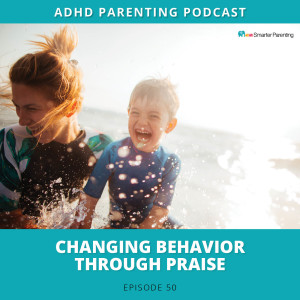
Wednesday Dec 11, 2019
Ep #50: Changing behavior through praise
Wednesday Dec 11, 2019
Wednesday Dec 11, 2019
One of the best things parents can do to improve their child’s behavior is to give Effective Praise. Changing behavior through praise is effective and powerful as it promotes a growth mindset for kids.
Adults and kids alike
There is a difference between general praise and the behavior skill of Effective Praise. Effective Praise gives your child a specific reason for their positive behavior AND a motivation why they should repeat the action.
When parents combine specific behavior and motivation, they are helping their child gain confidence in their ability to behave well.
General praise looks like, “Good job.” Or, “I’m so proud of you.” Statements like that don’t tell your child why you’re proud of them or what they did well.
Effective Praise would look like, “Great job for putting your backpack away without asking. When you put your backpack away, you’re able to find it in the morning without looking all over for it, and that allows you to be first to the bus stop and gives you more time to play with your friends.”
Effective Praise allows your child to know exactly what behavior they did well, putting away their backpack, and gives them a reason to continue the behavior, getting to the bus first and playing with their friends. Children are concrete thinkers. Having specifics is extremely helpful for them.
The hardest element of giving Effective Praise is finding a reason that is meaningful to your child to continue the behavior. Children are more likely to repeat the behavior if they understand they will be getting something out of it. Often, we give reasons that are meaningful to us and not meaningful to them.
As you consistently praise your child, you will see improvements.
Effective Praise should be given any time a child is doing something well--whether that is big or small. When children have a lot of behavior issues, it can be challenging to find something to praise. No child is so bad that there isn’t something that can’t be praised. It may be small, but it’s there. It could be something like giving you eye contact, looking up from their phone, or putting their clothes on the chair instead of the floor.
Whatever it is, praise them for it. When you praise for small things, the big things will start improving too.
The power of praise should not be overlooked. On the Smarter Parenting website, you can find the behavior skill of Effective Praise. We challenge you to watch it and then to start using it in your family. Using it will change the whole dynamic of your family.
Changing behavior through praise will be one of the best gifts you give your family.
Learn the skill of Effective Praise here: https://www.smarterparenting.com/lesson/view/effective-praise/
For full show notes and transcript visit: https://www.smarterparenting.com/adhd-parenting-podcast/
Join the Smarter Parenting Club. https://club.smarterparenting.com/
To keep these podcast coming, donate to Smarter Parenting here: https://www.smarterparenting.com/donate-now/
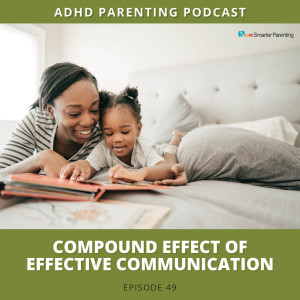
Monday Dec 09, 2019
Ep #49: Compound effect of Effective Communication
Monday Dec 09, 2019
Monday Dec 09, 2019
Join the Smarter Parenting Club. https://club.smarterparenting.com/
We communicate daily. We don’t always communicate effectively.
The importance of communication skills cannot be overlooked. When we use Effective Communication with our kids, we create a compound effect that helps our children throughout their lives.
Effective Communication is more than just the words we speak. It’s how we get our message across. It’s our voice tone, our body language, our actions, etc. We can improve our communication skills by using the steps of Effective Communication.
Effective Communication allows us to monitor our non-verbal cues and helps our child feel understood. When we use Effective Communication, we know what we heard is what they were trying to say — removing so much of the “miscommunication”.
When a child feels heard, even if we don’t always agree with what they’re saying, it goes a long way to strengthen and build our relationship. It also gives them confidence that they can express themselves in any situation, without getting frustrated or angry. Effective Communication is a skill, and you can learn how to communicate with your child better by visiting https://www.smarterparenting.com/lesson/view/effective-communication/
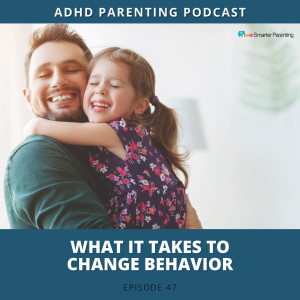
Wednesday Dec 04, 2019
Ep #48: What it takes to change behavior
Wednesday Dec 04, 2019
Wednesday Dec 04, 2019
Join the Smarter Parenting Club. https://club.smarterparenting.com/
Do you want to know the secret of changing behavior? It’s Role-playing! We can’t stress enough how powerful Role-plays are in improving your child’s behavior and preparing them for new situations!
What is a Role-play? It is just like it sounds. It’s where you and your child accept a role to practice new behavior. Role-playing allows your child to see what is required of them and gives them to the ability to practice it over and over until they’ve mastered it. Role-plays work on kids of all ages and can be used to practice almost any situation.
Role-plays do not have to be complicated. Adding too many elements to a Role-play reduces its successfulness. Especially for kids with ADHD, it’s better to do multiple small Role-plays than one large Role-play.
When using Role-playing, we recommend the following.
First, Role-play at a neutral time. When you Role-play at a neutral time, your child is better able to learn the new behavior. If they are distracted or frustrated, they are less likely to be successful in learning a new behavior.
Second, Role-play multiple times. It’s been proven that repetition is essential when it comes to learning new behavior. It’s vital to practice numerous times throughout the day to make sure your child has mastered the new behavior.
Third, do reverse Role-plays. Reverse-Role play is where you and your child switch roles. Changing roles allows you to show them what you expect of them. You can also show them what they are doing incorrectly. Reverse Role-plays teach them greater empathy as it helps them better understand what they’re doing and how that behavior makes others feel.
Children learn through play. Role-play allows you to take what is already second nature to them and apply it to new situations and behavior. It’s especially helpful if you’re funny or silly as it makes Role-plays seem more like play than learning.
Without Role-playing it is almost impossible to change behavior. Children need that practice.To learn more about Role-playing visit: https://www.smarterparenting.com/lesson/view/role-playing/
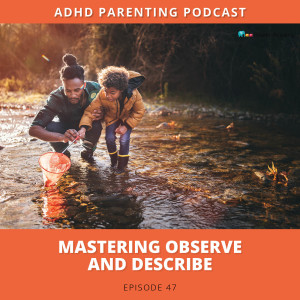
Monday Dec 02, 2019
Ep #47: Mastering Observe and Describe
Monday Dec 02, 2019
Monday Dec 02, 2019
The ability to observe and describe behavior is a foundational skill used in every lesson taught through Smarter Parenting, and therefore an essential one to master.
Observe and Describe is exactly what it sounds like. You observe what is happening, and then you describe what you see. Describing behavior can be used for both positive and negative situations.
Using descriptive words (instead of being vague or labeling) is helpful since it keeps the focus on the behavior. This removes the emotion that often comes with negative behavior, it allows for more clear communication, and it helps keep the situation from escalating.
Children with ADHD especially have a hard time connecting their behavior with what is happening. Using Observe and Describe helps them connect their behavior to what you want or don’t want.
Explaining behavior without emotion gives parents options for how to respond. It’s hard for children to argue with what is happening when parents describe what they witnessed.
Parents that master Observe and Describe find that their relationships improve and feelings of frustration and helplessness decrease. We can’t stress enough how important it is to master Observe and Describe.
To learn more about Observe and Describe visit: https://www.smarterparenting.com/lesson/view/observe-and-describe/
For full show notes and transcript visit: https://www.smarterparenting.com/adhd-parenting-podcast/
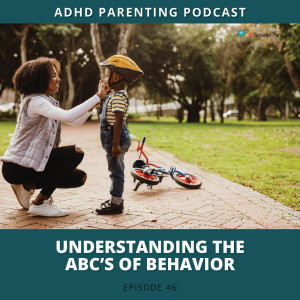
Wednesday Nov 27, 2019
Ep #46: Understanding the ABC's of Behavior
Wednesday Nov 27, 2019
Wednesday Nov 27, 2019
The ABC’s of Behavior is a powerful tool in helping understand behavior and why it happens. Understanding what causes challenging behavior and what to do once it begins gives parents a better way to handle problems. This in turn strengthens the relationship we have with our child. It also teaches them how to successfully navigate the world around them without our help.
The ABC’s of Behavior is an acronym. It stands for Antecedent, Behavior, and Consequence.
Antecedent means what happened before the behavior. It requires us looking at what happened 30 seconds, 5 minutes, or even an hour or two beforehand. The goal with the antecedent is to understand what the catalyst was for the behavior. Did they get in trouble at school? Did they miss a nap or snack? Did they break a favorite toy? Did someone say something mean to them? When we understand what caused the behavior, we can give them tools to either prevent or better handle the problem when it or something similar reoccurs.
Behavior is what is happening. Behavior could mean sulking, throwing things, yelling, or being angry. Behavior is what we want to prevent, change, or fix. Addressing behavior at this stage is less effective than addressing it before it becomes a problem.
Consequence is what happens after the behavior. What consequence(s) or reward(s) did they receive? We may be reinforcing negative behaviors by giving a reward instead of a consequence. If we reward our child with a sucker after a tantrum, we reinforce that throwing a tantrum is the way to get a sucker. Consequences should match the behavior and should teach and not punish a child.
The ABC’s of Behavior is one of the skills of the Teaching-Family Model. The Teaching-Family Model is one of the most highly researched evidence-based treatment methods in the world. It has been used since the 1960s by practitioners all over the world because it works!
For more information about the ABC’s of Behavior and the rest of the behavior skills of the Teaching-Family Model visit: https://www.smarterparenting.com/lesson/view/the-abcs-of-behavior/ For full show notes and transcript visit: https://www.smarterparenting.com/adhd-parenting-podcast
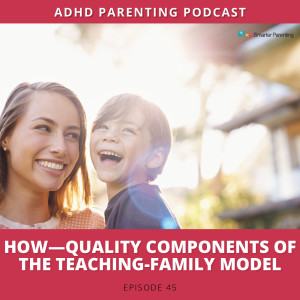
Monday Nov 25, 2019
Ep #45: How--quality components of the Teaching-Family Model
Monday Nov 25, 2019
Monday Nov 25, 2019
The Teaching-Family Model incorporates quality components into each behavior skills to bring about change in your child while strengthening relationships. Quality components are the ability to recognize the quality of what we're doing when it comes to the interactions with our child to get the outcome we want.
Not all the interactions we have with our children are quality. Sometimes our voice tone isn't appropriate. Sometimes our body language may be threatening. Sometimes we assume our children hear us or understand what we mean.
The Teaching-Family has built-in checking to make sure we're using quality components. Along the way, it requires us to evaluate how we are doing? Are we using an appropriate voice tone? Are we teaching each of the steps? Is our child internalizing the steps of the skills?
It's these built-in quality components where the real power of the Teaching-Family Model lies. Quality components are there to strengthen and build relationships and to give parents the parental guidance they need.
While using quality components may sound overwhelming, it's not. Quality components become second nature as you use the behavior skills found on Smarter Parenting. Any parent willing to spend the time to learn the behavior skills will see change. Behavior skills work! Using behavior skills will make your life easier as they will give you the tools you need to raise successful children.
Using the five elements of the Teaching-Family Model truly is the roadmap your family needs to begin seeing change today!
For full show notes and transcript visit: https://www.smarterparenting.com/adhd-parenting-podcast/
To learn the behavior skills of Smarter Parenting visit:https://www.smarterparenting.com/
Join the Smarter Parenting Club. https://club.smarterparenting.com/
